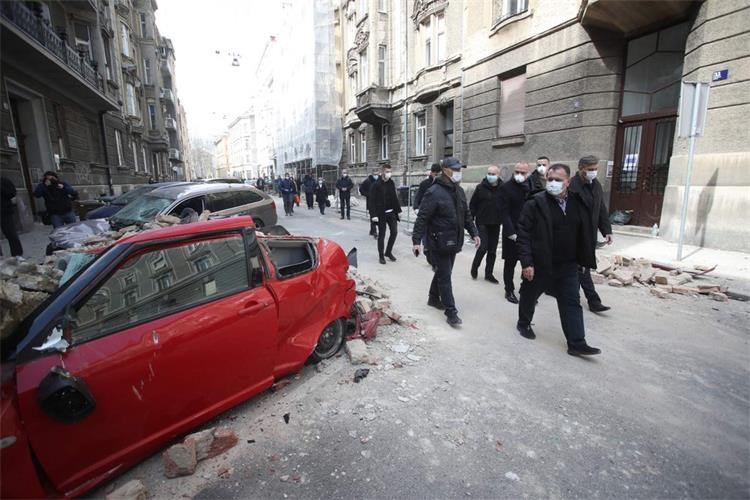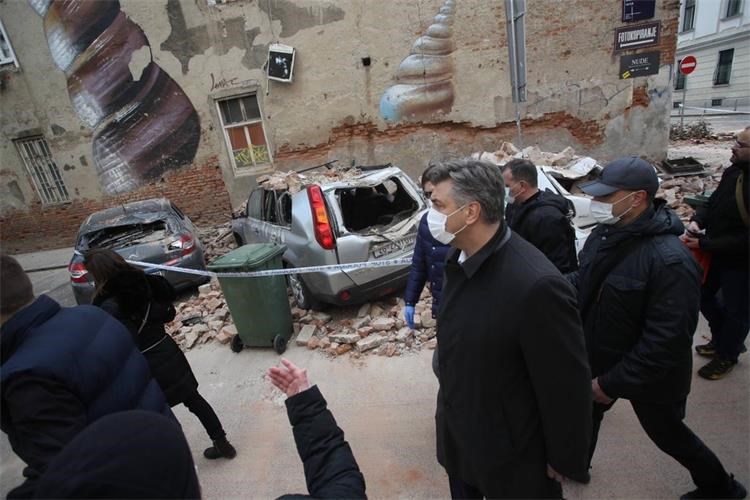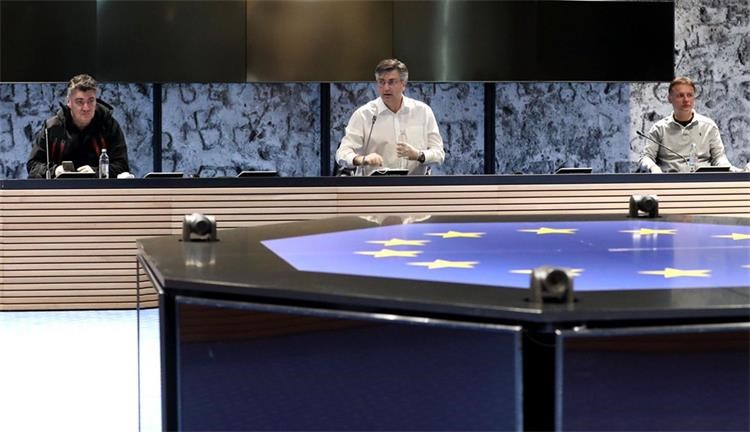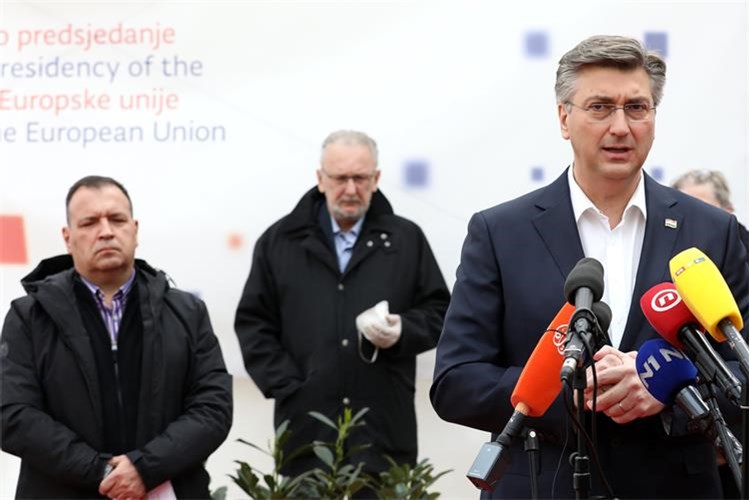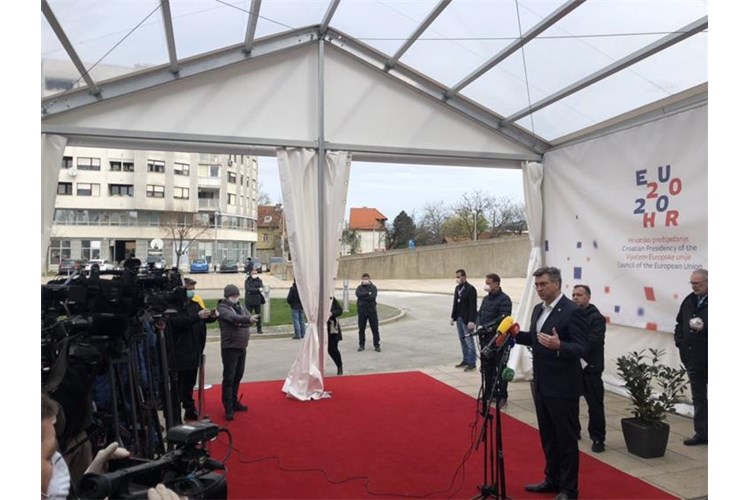- Published: 22.03.2020.
PM says earthquake, coronavirus crises being managed well
Prime Minister Andrej Plenkovic said on Sunday the centralised management of the coronavirus crisis and the aftermath of the earthquake that struck Zagreb this morning was going very well.
He told the press all Zagreb residents whose homes were damaged in the quake would be accommodated in the Cvjetno Naselje student dormitory, which has been emptied for this purpose.
Plenkovic said the people who had nowhere to spend the night could call the toll free number 0800 8805 and obtain the necessary information.
If necessary, several other accommodation locations will be prepared, he added.
The prime minister said the police and the army would use drones to check the state of the roofs and urged citizens to be careful about collapsed chimneys and roofs. "Walk as far away from the buildings as possible."
He said that after the first earthquake, there had been about 30 aftershocks. He asked citizens not to forget the coronavirus epidemic because of the earthquake so that Croatia did not experience an Italian scenario with COVID-19. "Personal discipline and the social responsibility of every one of us are of paramount importance in these new circumstances."
Contacts with leaders of EU and neighbouring states
Plenkovic said that since this morning he had spoken by phone with European Council President Charles Michel and Commission President Ursula von der Leyen, adding that the prime ministers of Slovenia, Hungary and Poland as well as other statesmen had contacted him and said they were willing to help.
Plenkovic announced that on Monday Foreign Minister Gordan Grlic Radman would hold a video conference with his EU counterparts and Finance Minister Zdravko Maric with his counterparts.
Bozinovic: Those spreading fake news must be severely punished
Interior Minister Davor Bozinovic said that everyone spreading fake news must be severely punished and that the police were already looking into that.
He said over 150 civil engineers were on the ground and that 67 buildings were damaged in today's earthquake.
Speaking of measures to contain COVID-19, Bozinovic said it was visible that less people were outside today, also due to the quake. "They understand that by not complying with decisions, they put additional pressure on the emergency services."
Asked about the many people who were leaving Zagreb for their weekend homes fearing new earthquakes, Bozinovic said they need not leave the capital and that those entering small towns and islands would be listed because local healthcare did not have the sufficient capacity for dealing with coronavirus.
He said that on Monday Zagreb city services would ensure bus transport for those who must go to work. "But only for them."
"We must help everyone who needs help. For that to succeed, we must reduce the spread of the virus. It looks simple but you see now that it's not that simple because people don't feel that they may be carrying the virus. That's why we are resorting to stricter and stricter measures," Bozinovic said.
He announced that Croatia would apply for EU assistance once the extent of the damage caused by the earthquake was analysed more thoroughly.
Prime Minister Andrej Plenkovic said on Sunday the number of those infected with coronavirus in Croatia had risen by 19 and now stood at 254, and thanked all services for the job done after a 5.5 quake rocked Zagreb this morning.
"After we visited the city and saw the extent of the damage, I'd like to thank first and foremost all the services which have given their maximum," Plenkovic told reporters after the second daily meeting of the state leadership.
He also thanked citizens for the responsibility shown as well as members of the press for swift and complete reporting.
"We have a combination of two contradictory crises. The coronavirus epidemic is serious, we now have 254 infected, a significant increase since this morning," the prime minister said.
He reiterated the importance of social distancing and appealed to citizens to see to that.
Beros: We are still on ascending curve of coronavirus epidemic
Health Minister Vili Beros said at the press conference that "we are still on the ascending curve of the epidemic, which is as expected. It's necessary to keep away from the walls of collapsed buildings but also to keep a distance from each other."
He said the safety of hospitals in Zagreb was being checked, that the situation in them was under control, and that patients were returning to those assessed as safe.
Beros said the girl gravely injured in the earthquake was still in treatment and that all others who were injured were taken care of.
He said two babies were born after the earthquake and that all premature children from the hospital for women's diseases and maternity were transferred to Dubrava Hospital.
Bozinovic: All services responded and did their job
"All emergency services responded in a short time and did their job in very complex conditions, given that we are simultaneously dealing with two crises, one is invisible, the other unpredictable," the head of the national civil protection authority, Interior Minister Davor Bozinovic, said at the press conference.
He thanked all civil protection services which engaged about 2,500 people, and said "the Croatian army, the police, civil protection and the healthcare system will be up to the mark as they have so far."
Members of Civil Protection have visited all parts of the city and provided direct assistance to citizens, and around 100 are currently erecting a tent settlement for 500 people in the Trg Franje Tudjmana Square, the city office for crisis management said.
Fifty teams are on the ground with more than 200 construction experts who are assessing damage caused to the buildings.
Text: Hina
